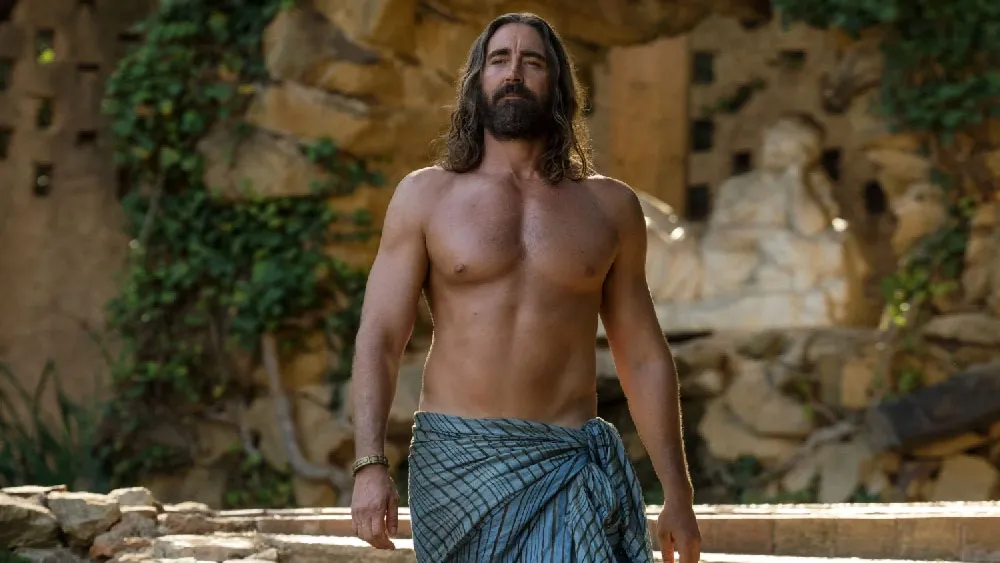July 2, 2012
'People Like Us' :: Chris Pine & Alex Kurtzman explore real-life mash-up
Sean Au READ TIME: 8 MIN.
Alex Kurtzman has produced and co-written (with his long-standing partner Roberto Orci) some of the most successful action television shows in recent years. The pair developed the repackaged "Hawaii Five-O" and co-created the sci-fi series "Fringe." With J.J. Abrams, they worked on the television series "Alias" and co-wrote the screenplay to Abrams' 2009 "Star Trek" reboot.
Last year Forbes Magazine profiled the pair under the title "Hollywood's Secret Weapons," observing that their films have made some 3 billion dollars in the past 10 years. "Orci and Kurtzman have proved that they know how to do the impossible: make movies that audiences like and studio heads love," the Forbes profile concluded.
The pair, though, wanted to make a film that was smaller and more intimate - a 180-degree turn from the big-budgeted action movies ("Transformers," "Mission: Impossible 3," "Cowboys and Aliens") they are usually associated with. Originally entitled "Welcome to People," their film - with which Kurtzman makes his directorial debut - comes to theaters this Friday, now renamed People Like Us.
For the film, Kurtzman fell upon a "Star Trek" connection: casting Chris Pine, that film's Captain Kirk, in the lead. Since that breakthrough role, Pine starred in "Unstoppable," as a train conductor attempting to stop a train carrying toxic chemicals from crashing into a Pennsylvania city, and the rom-com "This Means War," as a CIA operative competing with his partner for the attention of Reese Witherspoon.
Between these projects, Pine worked steadily in Los Angeles theater in productions of Neil Labute's "Fat Pig," Beau Willimon's "Farragut North" (which went on to be the basis of the film "The Ides of March") and Martin McDonagh's "The Lieutenant of Inishmore," for which he won the LA Drama Critics Circle Award.
In Kurtzman's film, Pine plays Sam who has had a difficult relationship with his record producer father. Upon his father's death, Sam discovers that he has been left with a record collection and pretty much nothing else. Still, the dead man has instructed Sam to deliver $150,000 of cash to an Los Angeles address. Straddled with a huge debt himself, Sam is tempted to keep the money for himself, but his curiosity leads him to a half-sister and a nephew he never knew he had. Rounding up the cast are Elizabeth Banks, who plays Frankie, the emotionally damaged half sister, and Michelle Pfeiffer as Sam's mother with her own secrets to hide.
Instead of handing the money to the half-sister, who is still trying to get her life back in order with the help of AA, Sam clumsily befriends her and the street smart kid, thereby complicating matters through spinning a web of white lies. The story draws from Kurtzman's real life experiences: he discovered his father had a secret family as well. EDGE talks to Kurtzman and Pine about their surprising turns in this rich family drama.
Fly on the wall
EDGE: Alex, your resume shows you've worked on projects like the first 'Transformers,' the 'Mission: Impossible' franchise, and TV shows like 'Fringe' and 'Alias,' but you have picked a drama for your directorial debut. Why this choice?
Alex Kurtzman: Part of the reason is that I met my sister when I turned 30 and really felt the need to write about the experience, but a lot of what you see in the movie are fictionalized version of the experience. I knew of them (my half sister and her child) but I just did not know them.
It is one of those things that... I grow up loving directors who told stories that are personal where I felt like a fly on the wall watching real people doing real things. I love the other movies that we have made equally, but I felt like as a director, my first time out, I was only going to get one shot to be that guy. This movie meant so much to me, so much. I just could not imagine handing it over to somebody else, so I chose it to be my first film.
EDGE: Which parts of the movie are from your real story and which parts of it you took artistic liberty in?
Alex Kurtzman: There is a lot of artistic liberty. My dad had had another family before he met my mum. After they divorced he met my mum and had us. We knew about them. We just did not grow up knowing them; but when we met, we obviously told each other immediately who we were, so there was no lie. Yet, the whole movie was based on the idea of a lie. Sam obviously did not tell Frankie about who he is. To me, that was dramatically very interesting because it made for such a complicated problem. All of that was invented. You know, what is the price tag that comes along with that choice for Sam.
Playing his director
EDGE: Chris, you play this character who is essentially based on Alex. What is your approach playing this role?
Chris Pine: Well, the great thing about Alex is that there was no prescription about how to play a character, which in many ways, is based on himself. He did not sit me down with a packet of how to play Alex Kurtzman. He kind of, lovingly and graciously, gave the script over to us, actors, to interpret as we saw fit.
One of the defining features of Alex as a director, and as a writer for that matter, is that for such a beautifully written script, nothing is precious, nothing is taken to be sacrosanct. So when you go to the process, everything is up for negotiation. Everything is up to be shaped and molded into whatever form is necessary to make it the best piece, and that is fun. That gets me charged. That gets me excited to come to work. We debate the hell out of tons of things. I would be stubborn and he would be stubborn, but it is always for the betterment of the material. It was just a great amount of fun.
EDGE: This is likely one of the most flawed and complex characters you have played. Did you draw from any of your own life experiences to play this role?
Chris Pine: Well, what has been fun about the movie is that many times when we talk to reporters, they will comment on their own families, their own experiences, whether or not the movie is reflective of what they have been through. So no matter what, the movie speaks to people. It makes them think about their own families, their own relationships.
So in order to make it come to life, I think it forces all of us to take a look at who we are, what our relationships to truth-telling is. It is not the easiest thing to do, but it is certainly the healthy thing to do to really be self reflective once in a while. This was like a constant 4-month check in, which was difficult at times but very, very rewarding.
Most difficult scene
EDGE: What was the most difficult scene for you?
Chris Pine: The whole movie was a challenge for me. One in particular, there is this moment when my character was talking to Josh (played by Michael Hall D'Addario), who is my nephew in the movie, I gave him these six rules. I told him these six rules my father had written in a music magazine many years before. Alex and I talked about this thing ad nauseum, forever and ever, and ever and ever. At one point, there were ten rules. I had a very difficult time with the scene. I felt it needed to be many things.
I did not know how to make all these things at once, but what I think ended up happening is that the moment is less about the rules, less about them talking, than it is about two people sitting across from one another and sharing a connection. Me and Josh, this young kid. They know what it is like to not have a father. They know what it is like to grow up without emotional connection. And as the older scarred man of that experience talking to the young man who is going through it, we are the only two people who know what it is like. The whole scene is about my saying that it is going to be okay. It is going to be really hard, but it is really going to be okay.
People Like Us opens on June 29.
Watch the trailer to People Like Us:





